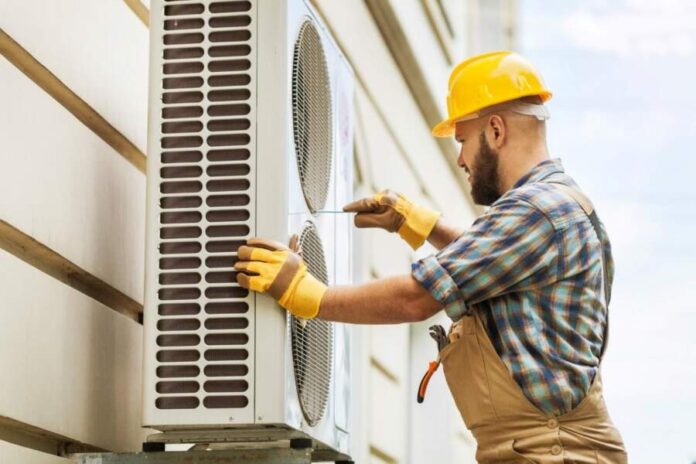Summer is here, and in a lot of spots around the USA, you’ve probably turned your AC on already. But if you’re here, reading this article, it’s likely your AC isn’t working correctly.
And it’s not just about comfortable interior temperatures. Did you know that a warm environment can also affect your sleep patterns and your overall health? That’s another reason why having a working AC is vital during the hotter months.
So keep on reading if you’re tired of asking, “why is my AC running but not cooling?”You can also check out homecaprice.com, an expert in cooling, if you have more cooling-related questions.
Why Is My AC Running but Not Cooling?
Split-system air conditioning units are widespread in residential areas. The main parts susceptible to breaking are the fan coil, AC compressors, and copper tubing.
But there are many other reasons why your AC is running but not cooling the house. And in most cases, you can do some simple troubleshooting techniques and fix the AC yourself.
So the question of “why is my ac running but not cooling” still stands. For starters, the best thing to do in these situations is to look at all the easy fixes first. This way, you can avoid wasting money on any unnecessary repairs or a whole new unit!
The Thermostat Was Changed
This seems very obvious, but many homeowners forget about this simple step. So start by checking your thermostat settings and ensure it’s cooling and not heating.
And if the thermostat is cooling, make sure no one has changed the temperature. This situation is prevalent, especially if you have children or a spouse who prefers a different temperature.
If the unit is off entirely, set it to heat, then switch it back to cooling. After a few minutes, check the registers to see if any cold air is blowing. If your AC is still running but not cooling the house, then check the filter next.
Dusty Air Filter
All AC units come with an air filter inside or near the indoor unit. This filter is important because it catches any airborne particles as they approach the air handler. Having a clean air filter is good for your health.
And it can also optimize your air quality and desired temperatures. So when you have a dirty air filter, it blocks the airflow, which reduces the cooling effect. And in some cases, your whole AC unit could shit down.
So start by turning off your AC, then find the location of the air filter. Once you’ve found the filter, carefully take it out and examine it. If you see that your air filter is overly polluted, replace it with a new filter and turn your AC on again. If your AC is still not cooling appropriately, then it’s time to check some other parts.
Condenser Is Dirty
The condenser is the unit that is outside of your home. The condenser mainly expels heat from your home. So if leaves or other particles block the area around this unit, it won’t remove hot air properly.
So if the above tips didn’t work, go outside and clean off the unit. Make sure you remove any dirt particles and cut any tall grass that may be blocking the unit. Once the unit is clear, go back inside and check the registers for cold air.
The Circuit Breaker Is Malfunctioning
Often, the circuit breaker can malfunction or become tripped. Therefore, most AC units will have a circuit breaker for the inside and outside units. These circuit breakers work with each other to keep your home cool.
So start by checking the breaker box to see if the outside breaker has malfunctioned or tripped. If this is the case, carefully switch it back on.
However, if it’s still malfunctioning, leave it be and call a professional. This could be a sign of an electrical issue which can be dangerous to fix yourself.
More Serious Repairs
If you’ve already tried all of the tips mentioned above, then there could be something more serious going on with your AC. Unfortunately, some of these issues do require a professional AC repair team.
However, by knowing the specific problem, you could save some time and money!
The AC Has a Frozen Evaporator Coil
Central air conditioning comes with an evaporator coil. These coils can quickly freeze over time and especially during the colder months.
So start by checking either your furnace or fan coil. If you’re not sure which one you have, look at your owner manual or contact your seller.
However, for fan coils, the evaporator will sit inside the fan coil cabinet. For a furnace unit, check the cabinet that is located outside the furnace.
This coil is critical because it converts warm outside air to cool air straight into your home. This process works by taking the outside air and then removing any humidity or heat energy.
So here are some signs that your evaporator coil is broken:
- Utility bills have gone up suddenly
- AC is running but not cooling
- AC is cooling but now sufficiently
- Signs of condensation around the indoor unit
- Frosting around the copper tubing
The Heat Pump Is Damaged
A heat pump is located outside and looks very similar to an AC unit. The pump’s main job is to heat and cool your home.
However, not all outdoor units are heat pumps. Some outdoor units use a different system. Nevertheless, most units work just like an AC condenser and have many of the same parts.
For example, the unit can be subjected to clogged coils, leaks, and faulty AC compressors. Unfortunately, a heat pump will require AC repair.
Unit Is Too Small For Your Home
BTU refers to the thermal units that an AC unit can provide per hour. During the making of your home, a professional should have calculated the needed BTU by measuring your home’s square footage.
However, other factors determine the best size AC unit for your home. For example, the insulation, the area you live in, and how well your home was built.
All of these factors will determine the BTU size. For smaller, well-built, and insulated homes, the BTU can be anywhere from 15,000 to 40,000. However, for larger or older homes, the BTU should be tripled.
Therefore if your current system has a low BTU for the size of your home, you may need a new unit! Over time, your unit might also break because it’s working overtime to keep your house cooler.
Faulty AC Compressors
If none of the above parts seem broken, call a professional and make sure your AC compressor is running. AC compressors are an essential part of the unit, so you will need repairs if this part breaks.
Here are some signs that your AC compressor is broken:
- Lack of cool air is one of the main signs of a broken compressor
- Hearing loud noises from your compressor’s motor
- If your hearing a hissing sound, this means there is an air leak due to a faulty compressor or obstruction
These signs can vary depending on how old the unit is and the size. However, if you’re experiencing two or more of these signs, your AC compressor could be the main culprit.
A Chemical Leak
Chemical refrigerants work by changing from liquids to gaseous materials. These gases pass through the coils of both the indoor and outdoor units. This refrigerant also takes all the humidity from inside the home and exerts it outwardly.
A severe leak can cause damage to the compressor and the whole system. And in the least severe cases, a refrigerant leak can cause inefficient cooling processes in your home.
Can I Fix My AC’s Major Issues?
It’s effortless to change a dirty filter or remove some leaves from your unit. However, for any electrical or internal issues, it’s recommended to hire a specialist.
Why are you asking? Well, for starters, internal issues require specialized tools and skills—something a DIY’er can’t achieve with a simple power tool and Youtube video. Not to mention, a severe electrical malfunction could be deadly.
Signs You Need a New AC Unit
Sometimes repairs won’t do the trick, and you’ll need a whole new unit! This can be frustrating, but a new AC unit, in some cases, can be cheaper than constant repairs.
So here are some signs that your AC unit needs to be replaced:
- If you notice moldy smells coming from your units or your vents
- Your energy bills have drastically increased
- If your AC unit has stopped running and cooling
- Your AC has gone through numerous costly repairs to no avail
- The life expectancy has very much run out
All of these could be a sign that you need a new AC unit. However, a professional will be able to diagnose your issue and confirm any required repairs or replacements!
AC Repair Costs
According to online estimate sites, the cost of AC repair depends on what needs fixing. For example, if you need a new condenser, the cost can range from $1,500 to $1,800. However, to repair a condenser, the prices are around $200 to $500.
The most expensive replacements will be the fan coils which can range from $2,000 to $2,500. In contrast, the cheapest fix is the freon recharge which is around $100 to $550.
How Much Is a New AC Unit?
For starters, when you buy a new AC unit, you need someone to install it professionally. The installation can cost anywhere from $600 to $5,000.
However, the cost of the unit itself is separate from the figure mentioned above. For example, a mini ductless system can cost anywhere from $4,000 to $5,000.
But, the cost of the systemic can be more expensive if the ductwork needs replacement as well! For example, a new duct AC plus a new duct system will cost anywhere from $5,500 to $10,000. However, if the duct systems are still viable, a new AC unit cost is around $3,000 to $6,000.
Ways to Extend Your AC Unit Life
There are ways to extend your ACs life. All it takes is some routine work and inspections. For starters, don’t have your AC running for an extended about of time. For example, if you won’t be home for more than three days, turn off your AC.
You should also have tune-ups during the spring season to ensure your AC runs in the summer! Regularly doing this will improve your system and air quality.
Changing the air filter is also very important for your health and your unit. It’s highly recommended that you check your air filter every 30 to 60 days. However, these times can change, depending on how much you use your AC.
One of the main reasons why your AC unit breaks is because of overworked units. Therefore, you should be cleaning the vents inside of your house. By doing this, you will optimize the cooling power and airflow.
Regularly cleaning both your inside and outside unit will prevent any blockages and will optimize your AC unit! Lastly, you should check for leaks periodically, especially after winter.
You can do this by checking the hoses attached to your indoor and outdoor unit. A leak can cause severe damages to the other parts of the AC unit. So If you detect a leak, call a professional immediately.
Get Your AC Fixed Today
You should never have to Google “why is my AC running but not cooling” now that you have the answers to this problem. So begin by checking all of the smaller stuff and work your way to the costly repairs. But, of course, if these simple home repairs didn’t fix your AC, it’s time to call in a professional repair service.
If you found this article helpful, don’t forget to check out our website for more DIY content.






























































